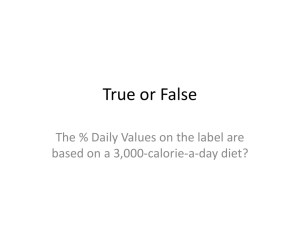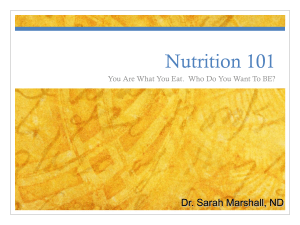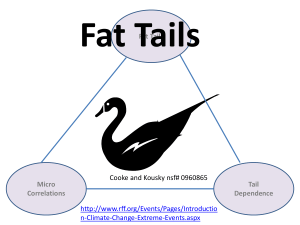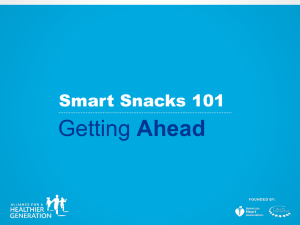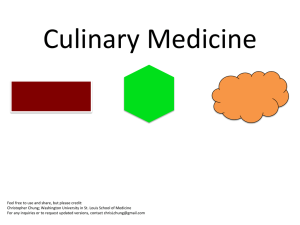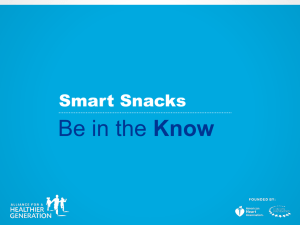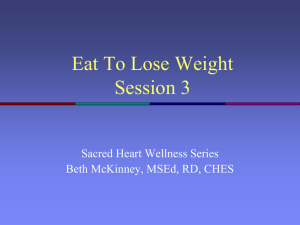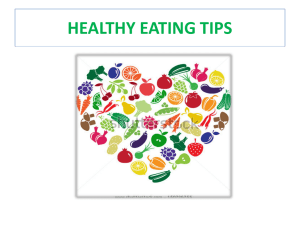Buying Food on a Budget - 4-H
advertisement
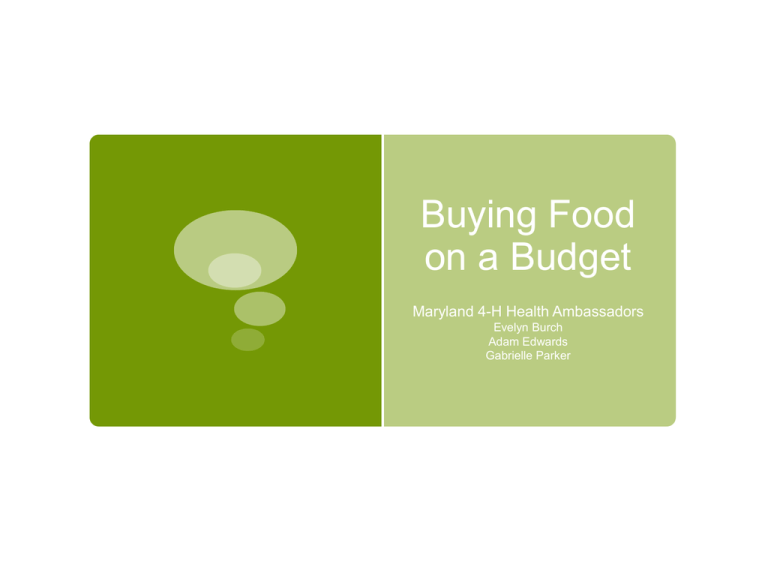
Buying Food on a Budget Maryland 4-H Health Ambassadors Evelyn Burch Adam Edwards Gabrielle Parker How to Teach Unit Pricing Evelyn Burch How to teach comparison of unit prices Question: What is the unit price? Answer: The unit price is the amount you’re paying for each “unit” (ounce, pound, etc.) of the product you’re buying. You could also call it the “true price of the product.” Question: Why is it important to know the unit price of an item? Answer: The unit price gives you a standard unit to compare multiple products and make the most budget conscious buying choice Understanding Unit Pricing What it looks like Comparing unit prices of the same product What is Unit Pricing?, November 18, 2013by Gina Petracca, Graduate Nutrition Student Comparing Unit Price Recap Unit price is a powerful informational tool which helps shoppers make informed decisions when purchasing food. It makes you aware of the true cost of a product and allows easy comparison of similar items. What is Unit Pricing?, November 18, 2013by Gina Petracca, Graduate Nutrition Student Give it a try ConsumerReports.org, Unit prices can help you save on groceries, Don't assume the larger package always is the best value, Published: August 14, 2013 10:45 AM What if the unit price isn’t listed? Find the listed price of the item you want to check Use the following formula--- Cost of Item / Quantity = Unit Price Example 18 oz. of peanut butter is $2.79 $2.79 divided by 18 = $0.16 per ounce Give it a Try A 15 oz. box of cereal costs $3.95. What is the unit price? (Price per ounce) Tips for Teaching Unit Pricing Use actual cans or packages of food with the price tags to allow participants to practice unit pricing skills in a hands on way. Compare store brands to name brands, see if there’s a difference. See if bigger/bulk is really cheaper, it usually is, but not always! If units are different (one item is in pounds, another in ounces), make sure that participants notice the difference. (Change 1 pound to 16 ounces etc.) Fat and Sugar Content Reading a Nutrition Label Adam Edwards How to teach about fat content Chocolate Milk Look for Total Fat in grams (9 grams) Divide the Total Fat by 4 to see how many teaspoons of fat are being consumed We find that approximately 2.25 or 2 ¼ teaspoons of fat are consumed in one serving of this brand of chocolate milk How to teach about sugar content Chocolate Milk Look on label for Sugars in grams (21 grams) Divide Sugars by 4 to see how many teaspoons of sugar are being consumed We find that approximately 5.25 or 5 ¼ teaspoons of sugar are being consumed in one serving of chocolate milk Give it a try! Calculate the sugar content in teaspoons this serving of soda 44/4=? Soda in Notes When teaching others about purchasing healthy food, show them how to calculate the fat and sugar content Draw attention to other important nutrition information such as the calories per serving, cholesterol, sodium, carbohydrates and protein Use the visual aid of showing fat and sugar content in the more tangible form of teaspoons or sugar cubes Easy Recipes Gabrielle Parker INGREDIENTS •1 can (10 oz. each) Ro*Tel® Original Diced Tomatoes & Green Chilies, undrained •1 package (16 oz. each) VELVEETA®, cut into 1/2-inch cubes DIRECTIONS 1. Combine undrained tomatoes and Velveeta in 1-1/2-quart microwave-safe dish; cover. Microwave on HIGH 5 minutes or just until Velveeta melts, stirring after 3 minutes. Cook over medium heat 5 minutes or until Velveeta is melted completely and mixture is blended, stirring frequently. 2. Remove from microwave; stir until mixture is blended. 3. Serve warm as a dip with tortilla chips, crackers or cut-up fresh vegetables. Find more like this at www.ro-tel.com Ro*Tel® Famous Queso Dip Amount per Serving Total Fat Saturated fat Cholesterol Sodium Carbohydrate Dietary fiber Sugars Protein Vitamin A Calcium Iron 5 gram 3 gram 18 mg 379 mg 16% 3 gram 0 gram % 4 gram 6% Vitamin C 11% 0% Calories 71 8% 16% 6% 1% 0% 8% 1% *Percent Daily Values are based on a 2,000 calorie diet Find more like this at www.ro-tel.com INGREDIENTS •1 can (15 oz each) Ranch Style® Black Beans, drained, rinsed •1 can (10 oz each) Ro*Tel® Original Diced Tomatoes & Green Chilies, drained •1/2 cup whole kernel corn, frozen or canned •1/4 cup finely chopped red onion •1/4 cup finely chopped fresh cilantro •1 tablespoon lime juice •1/4 teaspoon ground cumin •Tortilla chips, tacos or burritos, optional DIRECTIONS 1.Stir together beans, drained tomatoes, corn, onion, cilantro, lime juice and cumin in medium bowl. Cover and refrigerate 30 minutes to allow flavors to blend. 2.Serve with tortilla chips, tacos or burritos, if desired. NUTRITION INFORMATION Calories: 32 Serving Size: 12 servings (1/4 cup each) Find more like this at www.ro-tel.com Spicy Black Bean Salsa Amount per Serving Calories 32 Total Fat Saturated fat Cholesterol Sodium Carbohydrate Dietary fiber Sugars Protein Vitamin A Vitamin C Calcium Iron 0 gram 0% 0 gram 0% 0 mg 0% 129 mg 5% 6 gram 2% 2 gram 7% % 2 gram 3% 3% 4% 1% 3% *Percent Daily Values are based on a 2,000 calorie diet Find more like this at www.ro-tel.com INGREDIENTS One Mango - pit & skin removed 1/2 cup of plain lowfat or nonfat yogurt 1 Tablespoon honey 1/2 cup of water or 1 cup of ice Directions Combine cut up mango, yogurt, honey and water (or ice) in a blender. Blend until smooth. Makes 2 servings Number of Servings: 2 Find more like this at www.sparkrecipes.com Amount Per Serving Calories 137.8 Total Fat 1.2 g Saturated Fat 0.7 g Polyunsaturated Fat 0.1 g Monounsaturated Fat 0.4 g Cholesterol 3.7 mg Sodium 46.5 mg Potassium 310.2 mg Total Carbohydrate 30.6 g Dietary Fiber 1.9 g Sugars 19.6 g Protein 3.8 g Find more like this at www.sparkrecipes.com Steps to buy healthy food on a budget Know how to read nutrition labels- buy the healthiest option for the best buy. Write a grocery list before visiting the store- buy no more than you need. Buy produce in season. It costs less and tastes better! Choose canned foods that are low in sodium, fat, and sugar. Choose low fat dairy products to reduce fat and calorie intake. Compare unit prices to find the best bargain Excerpt from “Shopping for healthy foods” CookingMatters.org Thanks for Coming!

